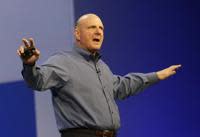Ballmer’s Pending Departure Only Makes His Mistakes More Obvious
The announcement of Microsoft (MSFT) CEO Steve Ballmer’s plans to retire within the next 12 months was just seconds old when shares of the famed software maker took off, up 8% in pre-market trading merely on investor glee that the king was (almost) dead.
In regular early trading, Microsoft shares were up 7% in to $34.68. Since Ballmer owns some 333 million shares, news of his retirement actually boosted his own net worth by about $1 billion.


But the announcement should have highlighted yet again one of Ballmer’s biggest missteps among his many strategic errors – his failure to develop a successor, or even a strong cadre of possible successors. Joachim Kempin, a senior Microsoft executive from 1983 to 2002, charged in his recent book that the situation is intentional because Ballmer felt threatened by promising future leaders and forced them out.
That means that, despite the initial stock market euphoria, Microsoft is probably facing months of uncertainty as it conducts a wide-ranging search for candidates inside and outside the company. And the search will occur while Microsoft faces huge challenges in all its businesses, from a possible deep slide in Windows sales and already failing tablet products to a cloud-services war and next-generation game console battle.
Possible candidates
Plenty of former top ‘softies are running other companies, including Stephen Elop at Nokia (NOK), Greg Maffei at Liberty Interactive (LINTA) and Don Mattrick at Zynga (ZNGA). Paul Maritz ran VMware (VMW) and now heads its spinoff, Pivotal. Former Windows chief Steven Sinofsky just announced he was joining venture capital firm Andreessen Horowitz as a board partner. They’re all possible candidates at this early stage.
Of those remaining at Microsoft, Ballmer recently restructured along functional lines instead of products, promoting a number of executives to high office in the process. The near-universal reaction was that the structure was of a "Ballmer and the dozen dwarfs" nature – especially compared to the lineup of executives established as “mini CEOs” in a 2005 reorganization.
The entire new group “doesn’t have the seniority of that original set of presidents, doesn’t have the breadth of experiences either inside or outside the company, and, in the new structure, doesn’t have the opportunity to be mini-CEOs,” Hal Berenson, a former engineer and manager at the company and now president of True Mountain Group, wrote in a blog post last month.
Among insiders, Julie Larson-Green received a ton of favorable press when she got the job running the devices and studios engineering group in the new reorg, but she lacks experience managing a huge organization.
Tony Bates, tabbed to head business development and evangelism, is also considered a possibility. He joined Microsoft as part of the $8.5 billion Skype acquisition in 2011. Before heading the Internet phone service, Bates had run a major unit at Cisco Systems (CSCO).
Chief Operating Office Kevin Turner mostly concerns himself with the company’s financials. He’s considered a possibility as interim CEO but likely lacks the tech experience to get the job permanently.
The 2005 reorg included some executive talent that went on to head other organizations, giving credence to the Kempin theory. Kevin Johnson, who became CEO of Juniper Networks (JNPR), ran Windows and online (ironically, Johnson announced his own retirement plans in July). Jeff Raikes oversaw the Office franchise. When he left in 2008 to head the Gates Foundation, Microsoft gave the job to Elop, now CEO of Nokia.
Immense challenges
No matter who replaces Ballmer, the challenges facing Microsoft are immense. PC sales are declining more rapidly than most expected, threatening Microsoft’s two golden-egg-laying geese: Windows and Office. Tablets and smartphones are rising overall but Microsoft’s offerings are laggards at best. In the corporate enterprise market, cost cutting is hurting all the major players and competition is intense in the hot areas of cloud computing and online storage, as well as software as a service.
So the next CEO will need to make a bunch of decisions quickly about how best to navigate the unsettled markets.
What kind of person would be best — or worst? The late Steve Jobs nailed it a few years ago in an interview with his biographer, Walter Isaacson, when he called Microsoft increasingly irrelevant.
"When the sales guys run the company, the product guys don't matter so much, and a lot of them just turn off," Jobs said, according to Isaacson. "It happened…when Ballmer took over at Microsoft." Then he noted, presciently, "I don't think anything will change at Microsoft as long as Ballmer is running it.”
At least now, change is finally on the way.
